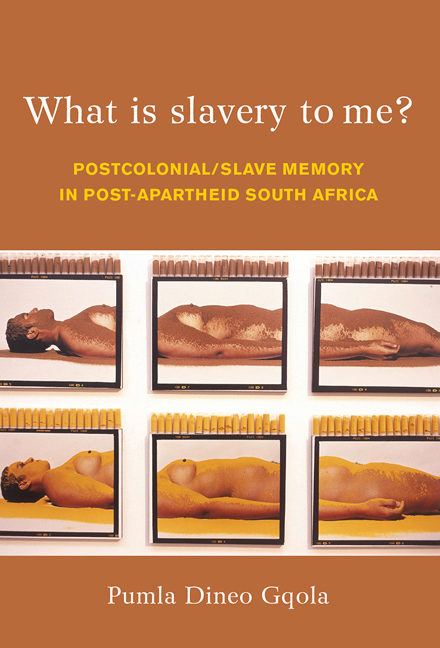Book contents
- Frontmatter
- Contents
- Dedication
- Acknowledgements
- Acronyms
- Introduction: Tracing (re)memory, thinking through echoes of colonial slavery in contemporary South Africa
- 1 Remembering differently: repositioned coloured identities in a democracy
- 2 (Not) Representing Sarah Bartmann
- 3 Whiteness remixed, or remembered impurity, shame and television
- 4 ‘As a slave you have to have faith or you'll give up’: Cape Malay/Muslim identity clusters in Cape Town
- 5 ‘Is the secret in cooking?’ Coded food, spice routes and processing Malay identities
- Conclusion: Unshackling memory, rememorying agency
- Endnotes
- References
- Index
1 - Remembering differently: repositioned coloured identities in a democracy
Published online by Cambridge University Press: 21 April 2018
- Frontmatter
- Contents
- Dedication
- Acknowledgements
- Acronyms
- Introduction: Tracing (re)memory, thinking through echoes of colonial slavery in contemporary South Africa
- 1 Remembering differently: repositioned coloured identities in a democracy
- 2 (Not) Representing Sarah Bartmann
- 3 Whiteness remixed, or remembered impurity, shame and television
- 4 ‘As a slave you have to have faith or you'll give up’: Cape Malay/Muslim identity clusters in Cape Town
- 5 ‘Is the secret in cooking?’ Coded food, spice routes and processing Malay identities
- Conclusion: Unshackling memory, rememorying agency
- Endnotes
- References
- Index
Summary
Post-apartheid South Africa has witnessed notable shifts in the scholarly and identitiary treatment of coloured subjectivities. Such shifts challenge earlier hegemonic conceptions of coloured people without necessarily completely dislodging them. These changes in the scholarly and political understandings of what coloured identities mean make sense given the specific prominence that colouredness has taken on in a general revisiting of racial identification and its languaging in a democratic South Africa, and:
A number of scholars of coloured identity in South Africa have suggested that the onset of democracy has permitted the creative and affirmative re-articulation of colouredness as a social identity in ways that were impossible under white supremacist rule.
(Strauss 2009: 30)In this chapter, I argue that such ‘re-articulations’ both challenge and rhyme with postcolonial discursive phenomena from elsewhere. This is especially the case when such shifts are read as mnemonic activity related to slavery, as foregrounded in the theorisation of shame by Zoë Wicomb (1996, 1998), and creolisation by Zimitri Erasmus (2001). The interventions of both Wicomb and Erasmus, key figures in the post-apartheid shifts in understanding constitutions of coloured identities, are analysed below.
In her influential essay ‘Shame and Identity: The Case of the Coloured in South Africa’, Zoë Wicomb (1998) argues that shame is a constitutive part of coloured identities. This shame infuses historic inscriptions of coloured people with miscegenation, degeneracy and non-belonging. It is this shame which undergirds the absence of a slave memory among coloured people, many of whom are descended from slaves, according to Wicomb. This repression of memory:
presumably has its roots in shame: shame for our origins of slavery, shame for the miscegenation, and shame, as colonial racism became institutionalized, for being black, so that with the help of our European names we have lost all knowledge of our Xhosa, Indonesian, East African or Khoi origins.
(Wicomb 1998: 100)For Wicomb, shame is partly constituted by the historical connections of ‘colouredness’ with degeneracy through associations with ‘miscegenation’ and its internalisation by members of the communities described as such. The additional part is linked to the devaluation of Black bodies and subjectivities under white supremacist periods. Consequently, those who are seen to embody both aspects of ‘inferior’ histories in the form of African ancestry and who are defined through discourses of miscegenation cannot avoid contamination by shame.
- Type
- Chapter
- Information
- What is Slavery to Me?Postcolonial/Slave Memory In Post-Apartheid South Africa, pp. 21 - 60Publisher: Wits University PressPrint publication year: 2010



